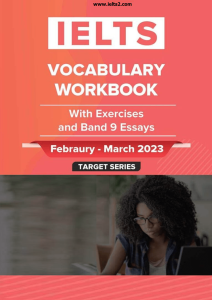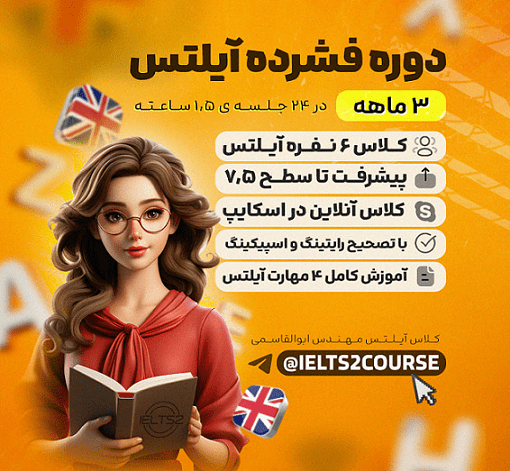دسته بندی انواع سوالات در اسپیکینگ آیلتس
Common Categories in ielts speaking questions part 1 2 3
دسته بندی سوالات اسپیکینگ آیلتس به ما کمک میکند در زمانی کوتاه تر بتوانیم یک تصویر روشن از آنچه در روز آزمون با آن روبرو خواهیم بود داشته باشیم. به همین دلیل سایت مرجع آیلتس IDP استرالیا هم در این زمینه یک مطلب با آپدیت سال 2024 منتشر کرده است. اما باید گفت آزمون اسپیکینگ آیلتس در کل به سه بخش اصلی تقسیم میشود و هر بخش نوع خاصی از سوالات را در بر میگیرد که برای ارزیابی جنبههای مختلف مهارت مکالمه طراحی شدهاند. در این آموزش به بررسی و دسته بندی سوالات در هر بخش نگاهی داریم و به نمونههایی از سوالات و پاسخ ها، و معیار های نمره دهی میپردازیم. برای دانلود PDF جزوه دسته بندی کامل تمامی سوالات پارت 1 تا 3 کلیک کنید.
دسته بندی سوالات اسپیکینگ آیلتس (پارت 1 2 3)
در اینجا بعد از ارایه اطلاعاتی کلی درباره اسپیکینگ آیلتس در هر بخش، به طور مشخص و جزئی تر به دسته بندی انواع Category های سوالات می پردازیم
پارت 1: بخش معارفه و آشنایی در مصاحبه آیلتس
توضیح کلی:
پارت اول یک گفتگوی ساده و دوستانه است که هدف آن سنجیدن توانایی شما در صحبت کردن درباره موضوعات روزمره و آشناست. در این بخش سوالات معمولا در 3 تا 4 دستهبندی مطرح میشوند و هر دسته شامل 2 تا 3 سوال است.
دسته بندی سوالات در پارت 1 (7 گروه)
- سوالات کلی
- تجربیات شخصی
- سوالات مربوط به دیدگاه
- سوالات مربوط به آینده
- سوالات فرهنگی
- سوالات توضیفی
- سوالات مقایسه ای
در ادامه برای هر گروه یک توضیح کوتاه و یک سمپل خواهیم داشت:
1. General Questions
These questions ask about your background or general preferences.
• Example: “What do you study?”
• Sample Answer: “I study psychology at university. I chose this field because I’m fascinated by human behavior and the mind. It helps me understand not only myself but also others around me.”
2. Personal Experience Questions
These questions inquire about your personal experiences related to the topic.
• Example: “Can you tell me about your favorite subject in school?”
• Sample Answer: “My favorite subject in school was history. I loved learning about different cultures and significant events that shaped our world. It opened my eyes to various perspectives and made me appreciate the complexity of human society.”
3. Opinion Questions
These questions ask for your views or beliefs on specific topics.
• Example: “Do you think education is important?”
• Sample Answer: “Absolutely, I believe education is crucial. It equips individuals with knowledge and skills necessary for personal and professional development. An educated society is generally more informed and capable of making better
decisions.”
4. Future Plans Questions
These explore your future aspirations related to education.
• Example: “What are your future plans regarding education?”
• Sample Answer: “In the future, I plna to pursue a master’s degree in organizational psychology. I believe that furthering my education will enhance my career opportunities and help me to contribute more significantly to human resources in organizations.”
5. Cultural Questions
These examine the educational practices or systems in your country or compare them with others.
• Example: “How does the education system in your country differ from that in other
countries?”
• Sample Answer: “In my country, the education system places a strong emphasis on rote memorization, especially in primary and secondary schools. In contrast, some countries focus more on critical thinking and creative problem-solving, which I think
can be more beneficial for students’ overall development.”
6. Descriptive Questions
These ask you to describe something related to education, such as a place or an event.
• Example: “Can you describe your school or university?”
• Sample Answer: “My university has a beautiful campus with modern facilities. There are well-equipped libraries and study areas, and it’s surrounded by green spaces, which make it a pleasant place to learn. The diverse student population also adds to
the vibrant atmosphere.”
7. Comparison Questions
These questions may ask you to compare different aspects of education.
• Example: “Which do you think is better: online education or traditional classroom
learning?”
• Sample Answer: “I think both have their advantages. Traditional classroom learning facilitates face-to-face interaction and immediate feedback, which can be very beneficial. However, online education offers flexibility and accessibility, allowing
students to learn at their own pace. Depending on an individual’s learning style, one might be preferable over the other.”
چند نمونه سوالات و پاسخ در پارت 1:
🔷 IELTS Speaking Part 1: Interview
Question 1: Where do you live?
Answer: I live in a bustling city called Tehran. It’s known for its rich culture, historical sites, and vibrant lifestyle. My neighborhood is relatively quiet, with plenty of green spaces and convenient amenities like shops and cafes. Although the traffic can be overwhelming, I enjoy the energy and diversity of city life.
Question 2: Do you enjoy reading?
Answer: Yes, I love reading, especially novels and self-help books. Reading allows me to escape into different worlds and gain new perspectives. I usually spend about an hour each evening with a good book, which helps me unwind after a busy day.
Question 3: Do you prefer eating at home or dining out?
Answer: I prefer eating at home because it’s healthier and more economical. I enjoy cooking and experimenting with new recipes. However, I occasionally dine out to try different cuisines and spend quality time with friends.
پارت 2: بخش ارایه یک پاسخ بلند (Cue Card) در مصاحبه آیلتس
توضیح کلی:
در این بخش، یک کارت موضوع (Cue Card) به شما داده میشود که شامل یک موضوع و 3 تا 4 سوال مرتبط است. شما 1 دقیقه زمان برای آمادهسازی دارید و باید 1 تا 2 دقیقه درباره موضوع صحبت کنید.
دسته بندی انواع سوالات در پارت 2 (12 گروه)
- توصیف یک شخص
- توضیف یک رویداد
- توصیف یک شیء
- توصیف یک مکان
- توصیف یک تجربه
- توصیف یک مهارت
- توصیف یک تجربه آموزشی
- توصیف یک موقعیت
- توصیف یک دستاورد
- توصیف یک مکان آموزشی
- توصیف یک دوره آموزشی
- توصیف یک سفر فرهنگی یا آموزشی
1. Describe a Person
These prompts ask you to describe someone important in your education, such as a teacher
or mentor.
• Example Prompt:
“Describe a teacher who has greatly influenced you. You should say:
o Who they are
o What subject they taught
o How they influenced you
o And explain why this influence was important to you.”
Sample Answer:
“One teacher who greatly influenced me was Mr. Ahmed, my high school mathematics teacher. He taught from the 10th through the 12th grade and truly transformed my perspective on learning. Initially, I struggled with math and found it quite challenging, but Mr. Ahmed had a unique way of teaching. His enthusiasm for the subject was infectious, and he made complex concepts much easier to understand by using relatable examples. For instance, he often incorporated real-life scenarios into his lessons, which helped me see the practical applications of mathematics in everyday life. Beyond just teaching math, Mr. Ahmed emphasized the importance of critical thinking and problem-solving skills. He encouraged us to approach problems creatively rather than just memorizing formulas, which changed the way I viewed challenges academically and personally. His support and guidance helped me gain confidence in my abilities, and I started to enjoy the subject more. He even organized after-school study sessions for those who needed extra help, fostering a sense of community among students. Mr. Ahmed’s influence was
significant not just because of his teaching style but also because he inspired me to pursue fields that require analytical and critical thinking skills, such as psychology, which I am currently studying at university. His impact made my high school
experience much more enjoyable and meaningful, shaping my academic journey in profound ways.”
2. Describe an Event
These prompts might ask you to describe a significant educational experience or event.
• Example Prompt:
“Describe an important educational event you attended. You should say:
o What the event was
o When and where it took place
o What you learned from it
And explain why it was important to you.”
Sample Answer:
“One important educational event I attended was a science fair last year at my university. The fair took place in March in the main auditorium and featured numerous projects from talented students across various disciplines. It was a vibrant
atmosphere filled with curious minds eager to share their research and learn from one another. I was especially drawn to the projects focusing on environmental science, which is my major. One project that stood out to me was about sustainable farming practices that aimed to reduce waste and improve productivity. The students behind the project explained how their methods could positively impact both the environment and local economies. I found it not only informative but also inspiring. Throughout the fair, I had the chance to engage with presenters and ask questions about their research. This interactive experience allowed me to deepen my understanding of the practical implications of scientific work and sparked my imagination regarding future projects I might undertake.
This event was significant for me because it reinforced my passion for environmental issues and highlighted the importance of awareness and education in tackling these challenges. It motivated me to consider how I could contribute to sustainable
practices in my future career, and I left the event feeling energized and hopeful about the impact young scientists can have on our world.”
3. Describe an Object
These prompts ask you to describe an item related to your education, like a textbook or a
gadget you use for studying.
• Example Prompt:
“Describe a book that has significantly influenced your education. You should say:
o What the book is about
o When you read it
o What you learned from it
o And explain why it was influential.”
Sample Answer:
“The book that has significantly influenced my education is ‘Mindset: The New Psychology of Success’ by Carol S. Dweck. I first encountered this book during my first year at university when I was struggling to adjust to the rigorous academic environment. In ‘Mindset,’ Dweck discusses the concepts of fixed and growth mindsets. A fixed mindset assumes that our abilities and intelligence are static, leading many individuals to avoid challenges for fear of failure. In contrast, a growth mindset
embraces challenges and views failures as opportunities for growth. This idea really resonated with me as I often found myself feeling anxious about my academic performance.
Reading this book changed my perspective entirely. Dweck provides numerous stories and examples from various fields, demonstrating how adopting a growth mindset can lead to greater achievement and satisfaction. I learned to appreciate the
process of learning rather than just focusing on grades. This shift was particularly pivotal during exams and challenging assignments, as I started to view difficulties as a normal part of the learning process.
The philosophy outlined in this book has continued to influence my approach to education and personal development. It has encouraged me to take on challenges that I would have previously avoided, such as joining study groups or participating in discussions. Overall, ‘Mindset’ has empowered me to see my education as a journey of personal growth and exploration.”
4. Describe a Place
These prompts might ask you to describe an educational institution or a study environment
you value.
• Example Prompt:
“Describe a library or study space that you find helpful. You should say:
o Where it is located
o What it looks like
o How you use it
o And explain why it is important for your studies.”
Sample Answer:
“I want to describe the library at my university, which I find incredibly helpful for my studies. The library is located in the heart of the campus, housed in a modern building with large glass windows that flood the interior with natural light. The
design is both aesthetically pleasing and functional, making it an inviting place to study. Inside, there are designated quiet study areas, numerous computer stations, and even group study rooms for collaborative projects. I often find myself spending several hours there, especially when preparing for exams or working on assignments.
The atmosphere is calm and conducive to concentration, a welcome respite from the sometimes hectic campus life. One of the library’s greatest resources is its extensive collection of books and academic journals, which are crucial for my research projects. I appreciate that it not only has physical books, but a plethora of digital resources too. Additionally, the librarians are always available to assist students in finding the information they need, which I find very supportive.
What makes this library particularly special to me is how it fosters a sense of community among students. I often run into classmates there, and we exchange ideas and study tips, which enhances my learning experience. This library is important for my studies because it provides the resources and environment I need to succeed academically and inspires me to delve deeper into my subjects of interest.”
5. Describe an Experience
This can include discussing educational trips, internships, or workshops.
• Example Prompt:
“Describe an educational experience that was important to you. You should say:
o What the experience was
o Who was involved
o What you learned from it
o And explain why it was important.”
Sample Answer:
“An educational experience that was very important to me was my internship at a local environmental NGO last summer. This opportunity was immensely valuable, not just in terms of practical knowledge but also in shaping my career aspirations. The
internship lasted for three months, and I was part of a team that organized community workshops focused on recycling and waste reduction. During this internship, I learned about various environmental issues and the importance of community engagement in making a difference. One of my major responsibilities was to help develop educational materials for the workshops, which taught residents about sustainable practices. I conducted research on best practices and collaborated with team members to create interactive presentations that would resonate with a diverse audience.
What made this experience crucial was the hands-on approach to learning. I gained practical skills in project management and communication and experienced the direct impact of advocacy work. Moreover, working alongside passionate individuals who were committed to environmental stewardship inspired me deeply and solidified my desire to work in this field after graduation.
Overall, this internship was not just about gaining professional experience; it was about understanding the challenges facing our environment and developing a passion for being part of the solution. It shaped my worldview and provided clarity about my future career path in environmental science.”
6. Describe a Skill
These prompts ask you to discuss a skill you developed through your education or
experiences.
• Example Prompt:
“Describe a skill you learned in school or university. You should say:
o What the skill is
o How you learned it
o How you use it now
o And explain why it is useful.”
Sample Answer:
“One important skill I learned during my time at university is effective communication. At first, I struggled to express my ideas clearly, especially during presentations. Recognizing this challenge, I enrolled in a public speaking course to improve my abilities. The course provided valuable techniques for organizing my thoughts and delivering my message confidently. Through practice and constructive feedback from peers and instructors, I became more adept at speaking in front of an audience. Today, I apply this skill in various aspects of my life. Whether it’s presenting my research findings to classmates, participating in discussions, or even during job interviews, being able to communicate effectively has opened many doors for me. This skill is particularly useful as it not only helps in academic settings but is also essential in my future professional career. Clear communication is vital in team environments, and I believe it contributes significantly to successful collaboration
and project execution.”
7. Describe a Learning Experience
These prompts may ask you to describe a specific learning experience that had a significant
impact on you.
Example Prompt:
“Describe a learning experience that had a big impact on you. You should say:
o What the experience was
o How it affected your understanding
o What the outcome was
o And explain why it was significant.”
Sample Answer:
“One of the most impactful learning experiences I had was during my biology class when we conducted a field study on local ecosystems. This experience took place in my second year of university, where we spent a weekend at a nature reserve,
collecting data on various plant and animal species. This hands-on experience deepened my understanding of ecological concepts that we had discussed in class. Seeing the theory in action helped solidify my knowledge of biodiversity and environmental interactions. It was eye-opening to witness firsthand how ecosystems function and how human activities can have a profound impact on them.
The outcome of this experience was not only an improved academic performance but also a renewed passion for environmental science. I became more committed to pursuing a career in conservation and sustainability. This experience was significant because it taught me the importance of experiential learning and spurred my active involvement in environmental advocacy initiatives within my community.”
8. Describe a Situation
These prompts may involve discussing a specific situation related to education that
challenged you or changed your perspective.
• Example Prompt:
“Describe a situation where you had to overcome a challenge in your studies. You should say:
o What the challenge was
o How you dealt with it
o What you learned from it
o And explain how it has affected your studies since then.”
Sample Answer:
“A challenging situation I faced during my studies was when I struggled with advanced mathematics in my first semester of university. Coming from a high school where I excelled in math, I was taken aback by the difficulty of the university-level
material. Realizing I needed to improve, I sought help from my professor during office hours and also formed a study group with fellow students. Together, we tackled complex problems and reviewed concepts that were difficult for me. Through consistent effort and collaboration, I gradually improved my skills and confidence. This experience taught me the importance of seeking help and the value of teamwork in overcoming challenges. It reshaped my approach to studying by making me more proactive in addressing difficulties. Since then, I have applied this lesson to other subjects as well, ensuring that I ask for help when needed and actively engaging with my peers for collaborative learning.”
9. Describe an Achievement
These prompts focus on a specific achievement in your educational journey.
• Example Prompt:
“Describe an educational achievement you are proud of. You should say:
o What the achievement was
o When it happened
o How you achieved it
o And explain why you are proud of it.”
Sample Answer: “One educational achievement I am particularly proud of is receiving the ‘Best Project’ award for my capstone project in my degree program. This happened just last year during my final semester at university. My project focused on developing a sustainable urban gardening initiative that aimed to promote local food production in urban areas. I spent months researching, planning, and collaborating with community members to bring this idea to life. The dedication and effort I put into it were enormous, as I had to gather data, draft proposals, and present my findings to a panel of experts in the field . What makes me proud of this achievement is not just the recognition I received but the positive impact the project had on my community. Many people expressed appreciation for the workshops we held, and I felt fulfilled knowing that my work contributed to raising awareness about sustainable practices. This achievement reinforced my commitment to environmental advocacy and encouraged me to look for similar projects in my future career.”
10. Describe a Course or Subject
These prompts ask you to talk about a specific course or subject that you enjoyed or found
challenging.
• Example Prompt:
“Describe a course or subject you enjoyed studying. You should say:
o What the course was
o Why you chose it
o What you learned from it
o And explain why you enjoyed it.”
Sample Answer: “The course I enjoyed the most during my studies was Environmental Policy. I chose it because I have always been passionate about environmental issues and wanted to understand how policies can influence conservation efforts. Throughout the course, we explored various aspects of environmental policy-making, including legislative processes, stakeholder engagement, and the analysis of existing policies around the world. One of the key projects involved creating a mock policy
proposal, which required us to research and present our ideas to the class. I enjoyed this course because it combined theoretical knowledge with practical application, allowing me to see the real-world implications of what we were studying. The discussions were engaging, and I appreciated having the opportunity to interact with passionate classmates and knowledgeable professors. This experience deepened my desire to work in environmental policy in the future, as I realized how crucial effective policy is for achieving sustainable outcomes.”
11. Describe a Place of Education
These prompts involve discussing an educational institution or environment that impacted
your learning.
• Example Prompt:
“Describe a school or university you attended. You should say:
o What it was like
o What subjects or courses you studied there
o How it influenced your education
o And explain what you enjoyed most about it.”
Sample Answer: “I would like to describe my high school, which was an important part of my educational journey. It was a medium-sized school located in a vibrant urban area, with a diverse student body. The school offered a wide range of subjects, including advanced science and mathematics courses, which greatly influenced my passion for these fields. The teachers were highly supportive and encouraged me to pursue my interests, often going beyond the syllabus to introduce us to real-world applications of what we learned.
What I enjoyed most about my school was the sense of community it fostered. There were many extracurricular activities, including science clubs, sports, and arts programs, which allowed me to explore different interests. I remember particularly enjoying the school’s annual science fair, where students showcased their innovative projects. This environment made me excited about learning and helped shape my aspirations for a career in science and technology.”
12. Describe a Cultural or Educational Trip
These prompts ask you to describe a trip that had educational significance.
• Example Prompt:
“Describe a cultural or educational trip you took. You should say:
o Where you went
o What you did there
o What you learned from the experience
o And explain why it was memorable.”
Sample Answer: “An educational trip that I found particularly impactful was a visit to the historical city of Kyoto in Japan, which I took during my university studies. The trip was part of our Asian history course, and it opened my eyes to the rich cultural
heritage of Japan……
نمونه سوال و پاسخ در پارت 2:
🔷 IELTS Speaking Part 2: Cue Card
Describe a house or apartment you would like to live in.
You should say:
what it would look like
where it would be located
what features it would have
and explain why you would like to live there.
Answer:
The house I would like to live in is a modern, eco-friendly villa located on the outskirts of a bustling city. The design would be sleek and minimalist, with large glass windows to let in plenty of natural light and provide panoramic views of the surrounding greenery. The house would have an open-plan layout, seamlessly connecting the living room, dining area, and kitchen, which would be equipped with state-of-the-art appliances.
Situated near a serene forest but within a short drive to the city center, the location would offer the perfect balance of tranquility and convenience. It would be close to essential amenities, such as schools, healthcare facilities, and supermarkets, while also providing access to recreational areas like parks and hiking trails.
The house would feature a spacious backyard with a garden and a small pool, making it ideal for relaxing or hosting gatherings. Sustainability would be a priority, with solar panels, rainwater harvesting systems, and energy-efficient insulation ensuring the house is environmentally friendly. A home office and a cozy library would cater to both productivity and leisure.
I would love to live in such a house because it aligns perfectly with my lifestyle and values. The combination of modern design, natural surroundings, and eco-friendly features would provide a comfortable, healthy, and inspiring living environment. It would not only meet practical needs but also support my aspirations for a balanced and sustainable life.

پارت 3: بخش بحث و گفتگوی مصاحبه آیلتس
توضیح کلی:
در پارت سوم، بحثی عمیقتر و پیچیدهتر درباره موضوعات مطرحشده در پارت 2 انجام میشود. این بخش توانایی شما در توضیح دادن، بحث کردن و ارائه استدلالهای منطقی را میسنجد. برای دانلود 1000 نمونه سوالات اسپیکینگ آیلتس با جواب PDF پارت 1 2 3 از صفحه مربوطه در همین وبسایت بازدید بفرمایید.
دسته بندی سوالات در پارت 3 (8 گروه)
- سوالات مربوط به دیدگاه
- سوالات مربوط به مقایسه
- سوالات مربوط به رابطه علت و معلولی
- سوالات مربوط به پیشبینی
- سوالات مربوط به توصیف
- سوالات مربوط به ترجیح دادن
- سوالات مربوط به موضع گیری
- سوالات مربوط به روایت یک تجربه
1. Opinion Questions
These ask for your views on a specific issue.
• Example: “What is your opinion about the importance of education in personal development?”
Sample Answer: “I believe education is crucial for personal development. It not only imparts knowledge and skills but also helps individuals develop critical thinking and problem-solving abilities. For instance, through my education, I learned to analyze different viewpoints, which has enriched my understanding and allowed me to make more informed decisions in life.”
2. Comparison Questions
These require you to compare two or more ideas.
• Example: “How does formal education differ from self-education?”
Sample Answer: “Formal education typically follows a structured curriculum with qualified teachers and standardized assessments, while self-education allows for a more personalized and flexible approach. For example, in formal education, students might follow a strict timetable in a classroom, while self-educators can choose what to learn and when to learn it, which can be beneficial for those with specific interests or learning styles.”
3. Cause and Effect Questions
These explore the reasons behind a situation or the consequences of actions.
• Example: “What are the main reasons for the high dropout rates in some educational systems?”
Sample Answer: “There are several reasons for high dropout rates. Primarily, many students face financial difficulties that make it hard to continue their education. Additionally, a lack of engagement or relevance of the curriculum often leads to disinterest. For example, students who do not see the connection between their lessons and real-world applications may feel that it’s not worth their time.”
4. Speculation Questions
Here, you’re asked to predict future trends.
• Example: “How do you think education will change in the next 20 years?
Sample Answer: “I think education will become increasingly technology-driven in the next two decades. With advancements in artificial intelligence and online learning platforms, students will have access to personalized learning experiences. For instance, we might see Al tutors that can adapt to each student’s learning pace and style, making education more effective and accessible.”
5. Explanation Questions
These require you to explain a concept or phenomenon.
• Example: “Why is lifelong learning important in today’s world?”
Sample Answer: ” Lifelong learning is essential today because the pace of change in technology and the job market is rapid. Continuous learning helps individuals stay relevant and skilled. For instance, many professionals now take online courses to maintain their competitiveness, especially in industries that constantly evolve, like IT and healthcare.”
6. Preference Questions
These ask you to express what you prefer and why.
• Example: “Do you think vocational training is more beneficial than academic education?”
Sample Answer: “I believe vocational training can be more beneficial for many individuals, especially those who want to enter the workforce quickly. It provides practical skills that are directly applicable to specific jobs. For instance, electricians and plumbers often earn good wages without needing a traditional college degree, making vocational education a practical choice.”
7. Justification Questions
These challenge you to justify your opinions or statements.
• Example: “Why should education be accessible to everyone?”
Sample Answer: “Education should be accessible to everyone because it is a fundamental human right that promotes equality and social mobility. When everyone has access to education, it can help reduce poverty and improve the overall quality of life in a community. For example, countries that invest in universal education often see significant economic and social improvements.”
8. Reflection Questions
These involve reflecting on personal experiences and how they shape your views.
• Example: “How has your experience in education shaped your career choices?”
Sample Answer: “My education has significantly shaped my career choices, particularly in developing my interest in psychology. Through my studies, I discovered my passion for understanding human behavior, which led me to pursue a degree in psychology. This field offers countless opportunities to make a positive impact on individuals’ lives, something I find immensely fulfilling.”
نمونه سوالات و پاسخها در پارت 3:
🔷 IELTS Speaking Part 3: Discussion
Question 1: How can we encourage people to protect the environment?
Answer:
To encourage environmental protection, governments can introduce stricter regulations and provide incentives for eco-friendly practices. Public awareness campaigns highlighting the consequences of neglecting the environment are also crucial. On an individual level, schools can educate children about sustainability from an early age, and communities can organize initiatives like recycling drives. Technology also plays a role; apps and platforms can help people track their carbon footprint. Ultimately, fostering a sense of responsibility and urgency is key to motivating collective action.
Question 2: What role does technology play in education?
Answer:
Technology has revolutionized education by making it more accessible and interactive. Online platforms allow students to access resources and learn at their own pace, regardless of location. Tools like virtual reality create immersive experiences, enabling students to explore topics like history or science more effectively. However, excessive reliance on technology can reduce interpersonal interactions, which are crucial for holistic development. Therefore, a balance between traditional teaching methods and technology is essential for maximizing its benefits.
معیارهای نمرهدهی اسپیکینگ آیلتس (Band Descriptors)
آزمون اسپیکینگ بر اساس چهار معیار اصلی نمرهدهی میشود که هر کدام 25 درصد از نمره نهایی را تشکیل میدهند:
- Fluency and Coherence (روانی و انسجام):
- روان صحبت کردن بدون مکث یا تکرار بیش از حد.
- استفاده از عبارات ارتباطی برای ایجاد پیوستگی (مثل “in contrast” یا “as a result”).
- Lexical Resource (منابع واژگان):
- استفاده از واژگان متنوع و دقیق.
- بهکارگیری اصطلاحات و عبارات مرتبط با موضوع.
- Grammatical Range and Accuracy (تنوع و دقت گرامر):
- استفاده از ساختارهای گرامری پیچیده (مثل جملات شرطی یا مجهول).
- دقت در کاربرد زمانها، مقالات، و تطابق فعل و فاعل.
- Pronunciation (تلفظ):
- واضح و قابل فهم بودن صحبت.
- رعایت استرس و آهنگ جملات برای انتقال معنی.
جمع بندی و مطالب پیشنهادی
دسته بندی سوالات اسپیکینگ آیلتس (پارت 1 2 3) را با هم دیدیم. باید دقت داشته باشیم که آزمون اسپیکینگ آیلتس به طور هدفمند طراحی شده تا توانایی شما در برقراری ارتباط موثر و منطقی ارزیابی شود. پاسخ دادن به سوالات با دقت و گسترش ایدهها با استفاده از واژگان پیشرفته و ساختارهای گرامری پیچیده، کلید موفقیت در این آزمون است. تمرین مداوم با موضوعات مختلف و درک معیارهای نمرهدهی به شما کمک میکند به نمرهای بالا دست پیدا کنید.
در پایان نمونه سوالات دسته بندی شده اسپیکینگ آیلتس پیشنهاد آخر ما به دوستان گرامی هست. همچنین برای تعیین سطح و تعیین رایگان نمره اسپیکینگ و دریافت جدید ترین سمپل های نمره 9 در کانال تلگرام اسپیکینگ ما همراه باشید و به ادمین برای تعیین نمره اطلاع دهید.








